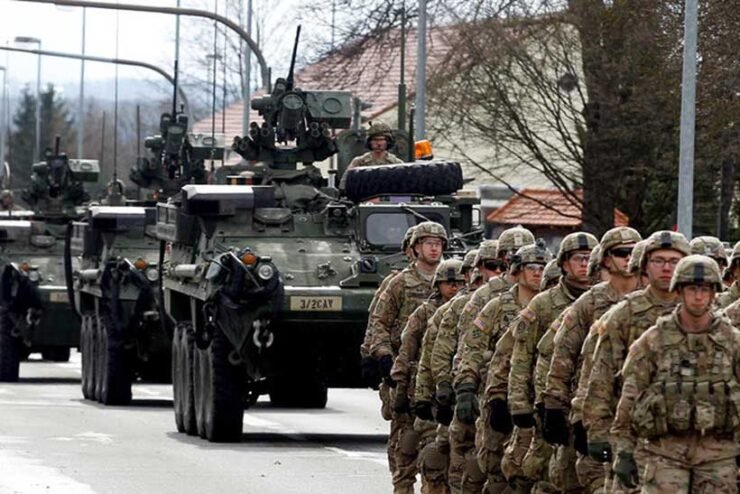Seven decades after the end of the Second World War Europe is on the brink of a new grave conflict that is testing not only the collective unity of Euro- American values but also the legitimacy of the Atlantic alliance system. This conflict pertains to the amassing of more than a one hundred thousand Russian troops along the border with Ukraine with almost ominous daily indications of a Russian invasion of Ukraine. America is painting a grim picture arguing that if Russia presses ahead with the invasion then it is only a matter of time before Ukraine falls. Clearly, the situation is very concerning and tension laced.
A Divided House
Despite the ostensible unity among the Euro-American nation states, there is little doubt that this alliance is a divided house. America has painted several grim scenarios where Russia can invade and annex Ukraine in a matter of days and hence the Euro-American response should be strong and massive. In contrast, Europe so far has desisted from giving any overt indication that it will take Russia head on. There are reasons for this –firstly, Russia is Europe’s most important gas supplier, Russian gas accounts for over 25% of Europe’s total gas imports, the Nord Stream 2 pipeline worth $11 billion is a testimony to European reliance on Russian conventional energy. Secondly, Russia is one of the biggest petroleum producers in the world and is a part of the OPEC+ cartel whose decision to not increase oil output substantially and the resulting Russian reduction in gas supply contributed to an unprecedented surge in European power and gas prices recently. Thirdly, there is the political issue involving Poland, Hungary, and Turkey who have been critical of the institutions of democracy and share a common disdain for democratic decision making and consensus building in Europe. They in fact have demonstrated their willingness to warm up to autocratic leaders like Putin and Xi Jingping.
The fact that Europe and America is a divided house and disagree on many fundamental issues has allowed Russia to dictate the terms of agreement such as a written assurance that NATO won’t expand eastwards and that Ukraine will never be made a part of NATO. The Euro-American unity is therefore clearly having a hard time putting its house in order.
Questions About Atlantic Treaty
Formed in 1949 to develop a common bloc to fight the spread of communism and Russian expansionism, NATO clearly has come a long way: The collapse of the Soviet Union and the end of communism in the former USSR and other East European countries coupled with the termination of the Warsaw Pact was the pinnacle of NATO’s achievements. However, several questions have been raised inter alia by several former European heads of states, academicians and even policymakers about the relevance of NATO. Nevertheless, the 9/11 attacks on American soil potentially gave it a new lease of life – to fight against Islamist radicalism and terrorism. However, this issue has created dissension from within the members of the bloc, particularly from Turkey, which has time and again accused the Judeo-Christian majority European partners of promoting Islamophobia and diluting European unity.

While these are issues of the past, the current Russian sabre-rattling along its border with Ukraine by amassing troops, carrying out military drills with Belarus, etc. has given NATO in general and the Euro-American bloc in particular a new lease of life. NATO, which for long after the end of the Cold War was battling a legitimacy crisis, has been reinvigorated with the objective of not only countering Russia but more broadly China, which has voiced surreptitious support for Russian’s assertion of force.
However, NATO members still disagree on fundamental points – for instance, in the event of Russia invading Ukraine, should European troops be directly deployed to counter Russian aggression? Should coercive actions to deter Russia go beyond economic sanctions? Or, should Ukraine be integrated into NATO, which has been the root cause of this Russian belligerence, etc. Clearly, the fact that France and Germany have been engaging in intense diplomacy to avert this crisis is an attempt to answer these questions.
Fighting Back
Despite the numerous disagreements and potential discord among the members of the Euro-American alliance, it would be a grave mistake to underestimate the strength and fortitude of NATO. The European Union is the most successful economic bloc in the world and America is the world’s economic and military powerhouse; despite receiving a shocking setback in Afghanistan, the US military packs a punch – the recent American Special Forces operation in Syria, which neutralized the new leader of ISIS, demonstrates the reach and might of American hard power. In the past Europe and America have worked together and gone on to vanquish Nazism and Fascism in Germany and Italy and most recently the Soviet Union.
Hence the Euro-American alliance is clearly still very much a force to reckon with. No matter what direction the conflict takes, it is clear that this will be the most challenging test of the vitality and legitimacy of the Euro-American alliance since the end of the Cold War and will be interesting to see how things turn next.
– The writer is currently working as a Research Associate at Defence Research and Studies (dras.in) and is a columnist. The views expressed are personal and do not necessarily reflect the views of Raksha Anirveda
–The writer is currently working as a Research Associate at Defence Research and Studies (dras.in) and is a columnist. The views expressed are personal and do not necessarily reflect the views of Raksha Anirveda






